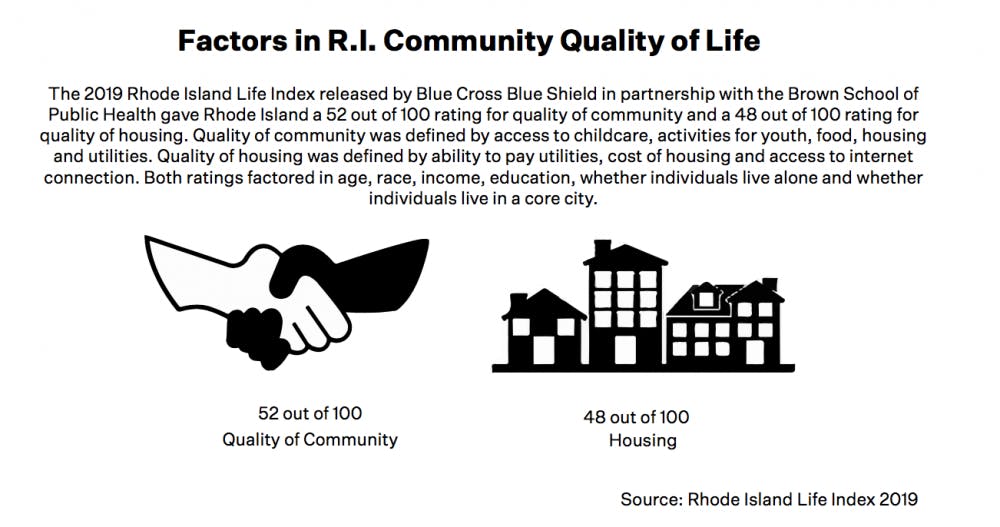Ocean State residents generally say that poor access to affordable housing lowers the quality of their communities more than any other factor, according to a report issued by health insurance provider Blue Cross Blue Shield Rhode Island in partnership with the University’s School of Public Health.
The report, released Oct. 23, examined how R.I. residents perceive various aspects of their community life. The report also examined factors that included food access, transportation availability, safety and employment. The researchers interviewed more than 2,200 respondents over the phone. Given the large sample size, the report can be understood to reflect the opinions of the entire state, said Melissa Clark, Professor of Health Services and Principal Investigator of the report.
Access to affordable, quality housing received a compiled score of 48 out of a possible 100 — the lowest score in the report. Participants were asked to evaluate cost of housing, ease of utility payment and access to affordable internet. Jobs scored almost as low, at 56 out of 100. To determine this score, respondents were asked about the availability of jobs paying living wages and access to adult education.
Clark said the report did not offer many surprises to those working in healthcare, but rather reinforced existing data and highlighted specific problems.
The report “gives additional data to organizations that are working in these areas as evidence of the importance of putting more resources into some of them, and … some that are very underfunded now,” Clark said.
Will Gomberg ’20, co-director of Housing Opportunities for People Everywhere, pointed to lack of funding as one of the largest barriers to addressing affordable housing issues in the state.
“Everyone knows there’s a crisis, and everyone knows there’s not enough resources being mobilized to address the crisis,” Gomberg said. The report has the potential to bring awareness to groups outside of the “housing and homelessness” sphere so that they recognize the significance of housing quality as a indicator of health, he added.
“Of all the issues facing our state, housing is among the most pressing,” Gomberg said. “We need to address it to effectively address anything else.”
Gomberg identified problems that might have factored into the poor rating of housing in the report, such as interminable waitlists, lack of state funding, old housing stock and income discrimination. Waitlists for housing benefits are “inaccessible,” sometimes leaving individuals in limbo for as long as a decade, he added.
The lack of a dedicated line item in the state budget for affordable housing leads to a dearth of sustainable funding, according to Gomberg. Additionally, the old housing stock can lead to health problems with lead, among other concerns. Beyond these issues, source of income discrimination by landlords prevents potential tenants from using housing vouchers to lease.
Gomberg also called for the University to work more to address its impact on housing in the state.
Clark said the University should invest more resources and people to study the quality of life in the state. For example, researchers from the School of Public Health could investigate the disparities identified in the report between opportunities for children and older adults compared to other populations, Clark said.
Ada Amobi, the physician lead at the Health Equity Institute for the Rhode Island Department of Health, was surprised by responses to a question about discrimination in the healthcare setting — only 7 percent of respondents said they had experienced discrimination, which was much lower than typical statewide findings in other research, according to Amobi.
While the study oversampled for children and older adults, it did not oversample for minority populations, which could have skewed findings about minority groups, she added.
To Amobi, the report highlights the importance of understanding that health issues are connected to more than just access to a doctor’s office. Factors like transportation, food access and safety should be considered as well.
“The question now is, ‘How can the public health community and the healthcare community … and other stakeholders work together to create a healthcare road map for Rhode Island knowing that everything is very much connected?’” Amobi said.
After the report’s release, Blue Cross Blue Shield announced its intention to direct its BlueAngel Community Health Grant program toward resolving the housing issues identified in the report. This grant was established 17 years ago, and since then has raised over $4,000,000 in funding for R.I.-based nonprofits, according to a BCBSRI press release.
According to the release that invited non-profits to apply for the grant, “The expectation is that by investing in access to safe and affordable housing, health outcomes for all Rhode Islanders will improve over time.”





